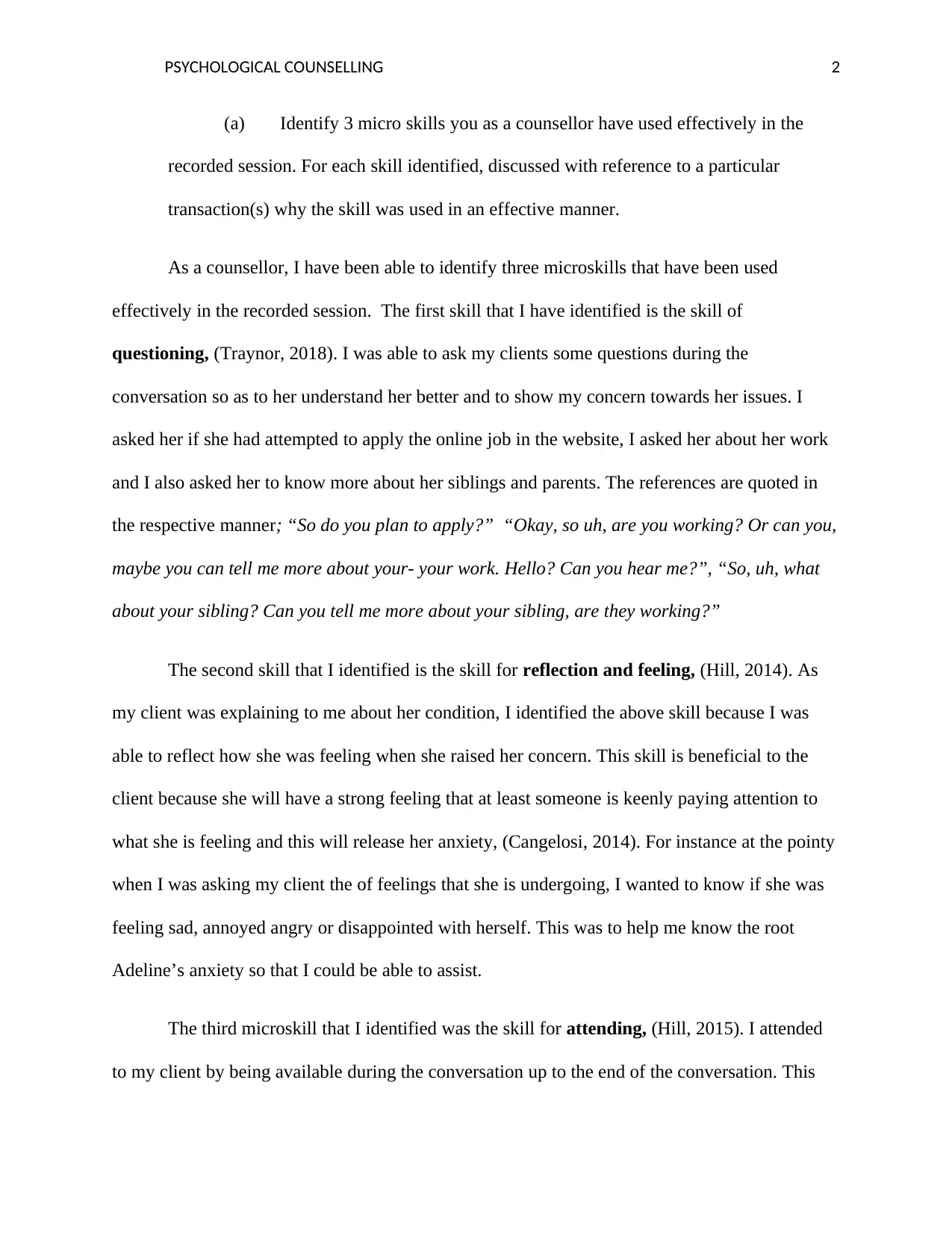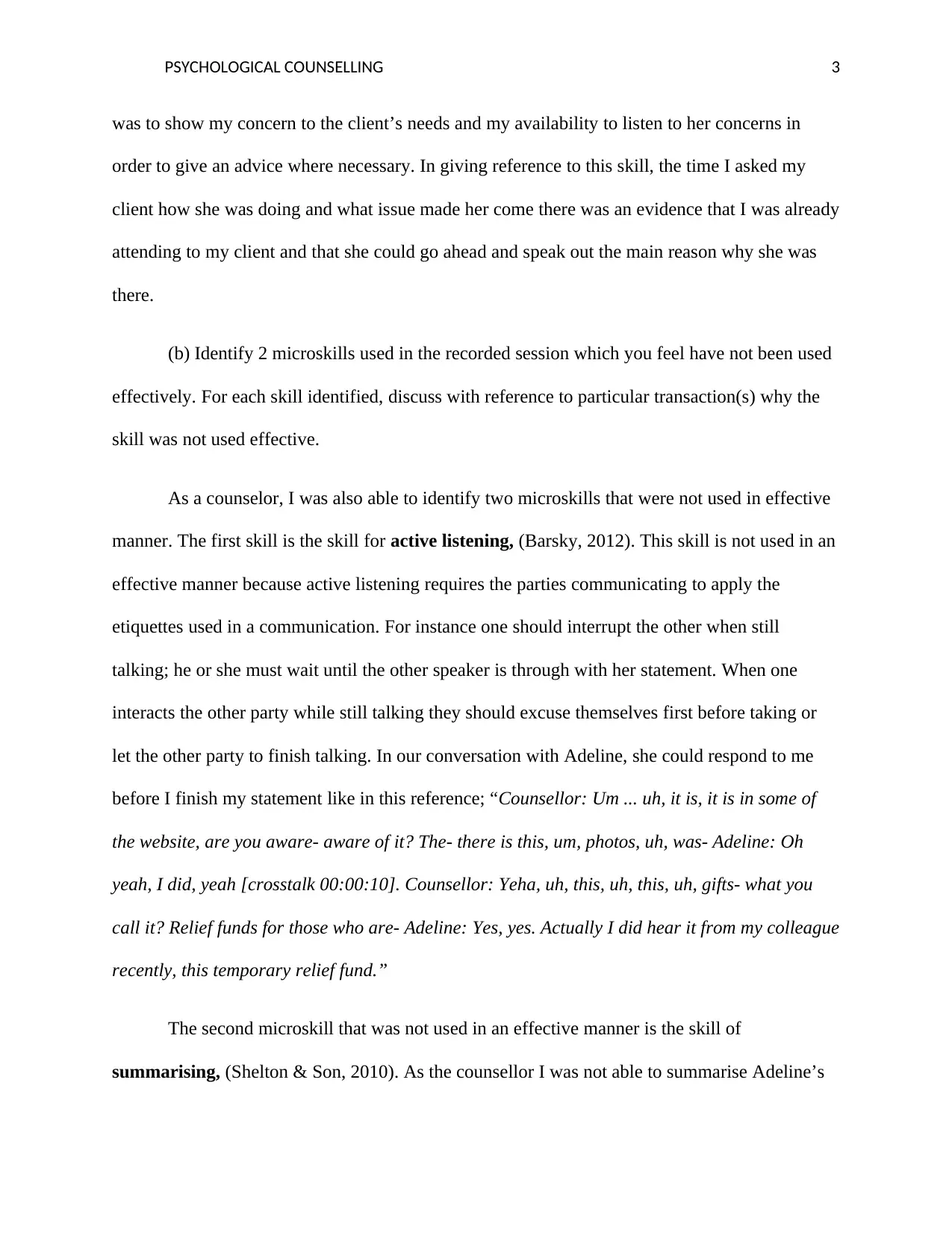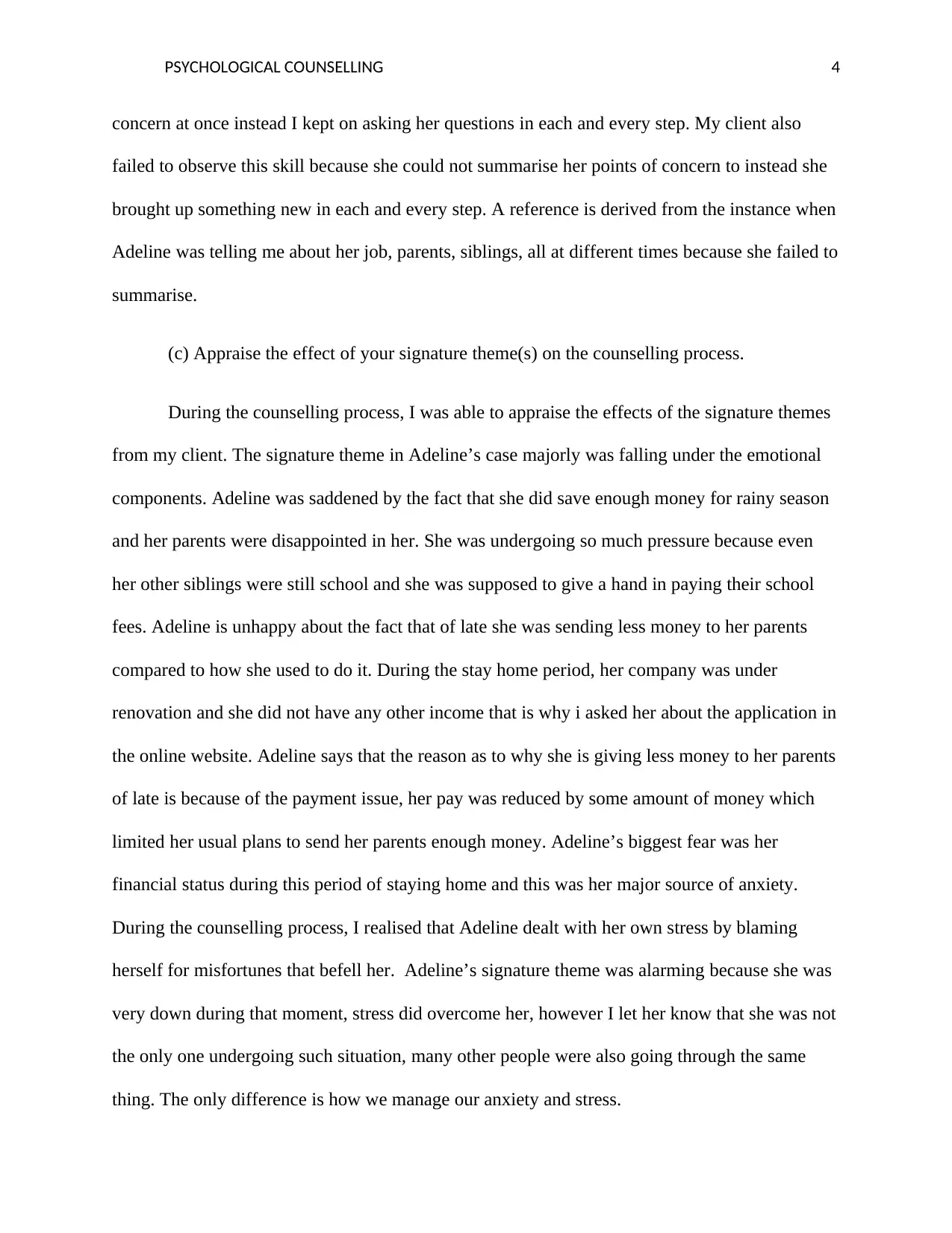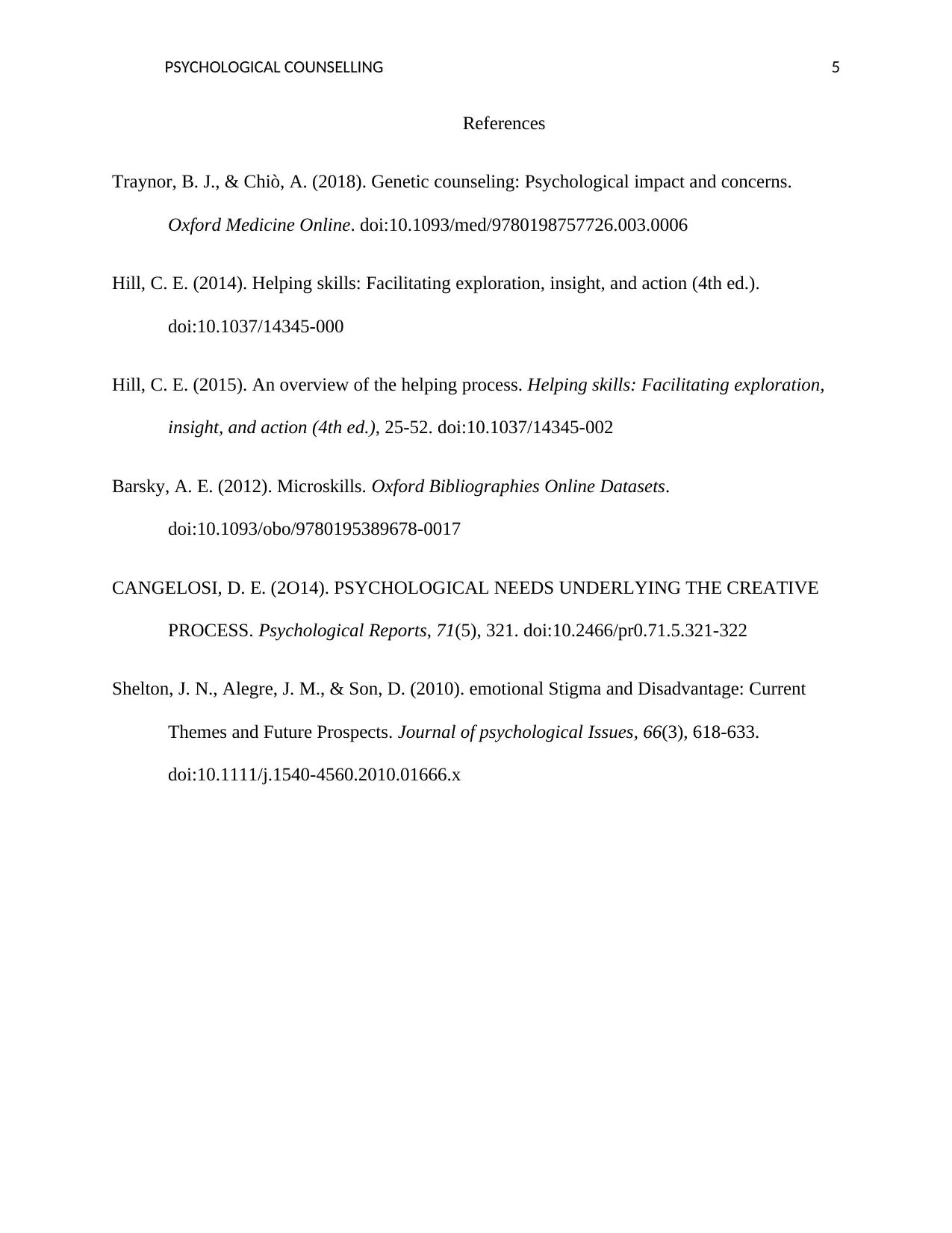Psychological Counselling: Microskills, Signature Themes and Analysis
VerifiedAdded on 2022/07/28
|6
|1372
|17
Homework Assignment
AI Summary
This assignment analyzes a recorded psychological counselling session, focusing on the counsellor's use of microskills. The analysis identifies three microskills used effectively: questioning, reflection of feeling, and attending, providing specific examples from the transcript to illustrate their effectiveness. Conversely, two microskills were deemed ineffective: active listening and summarizing, with the analysis explaining the instances where these skills were not properly executed. The assignment further appraises the effect of the counsellor's signature theme, centered around emotional components, on the counselling process, particularly concerning the client's anxieties and self-blame. The analysis references relevant literature on counselling microskills and techniques, highlighting the impact of these skills on the therapeutic process and client outcomes.

Running Head: PSYCHOLOGICAL COUNSELLING 1
Psychological Counselling
Name
Institution
Psychological Counselling
Name
Institution
Paraphrase This Document
Need a fresh take? Get an instant paraphrase of this document with our AI Paraphraser

PSYCHOLOGICAL COUNSELLING 2
(a) Identify 3 micro skills you as a counsellor have used effectively in the
recorded session. For each skill identified, discussed with reference to a particular
transaction(s) why the skill was used in an effective manner.
As a counsellor, I have been able to identify three microskills that have been used
effectively in the recorded session. The first skill that I have identified is the skill of
questioning, (Traynor, 2018). I was able to ask my clients some questions during the
conversation so as to her understand her better and to show my concern towards her issues. I
asked her if she had attempted to apply the online job in the website, I asked her about her work
and I also asked her to know more about her siblings and parents. The references are quoted in
the respective manner; “So do you plan to apply?” “Okay, so uh, are you working? Or can you,
maybe you can tell me more about your- your work. Hello? Can you hear me?”, “So, uh, what
about your sibling? Can you tell me more about your sibling, are they working?”
The second skill that I identified is the skill for reflection and feeling, (Hill, 2014). As
my client was explaining to me about her condition, I identified the above skill because I was
able to reflect how she was feeling when she raised her concern. This skill is beneficial to the
client because she will have a strong feeling that at least someone is keenly paying attention to
what she is feeling and this will release her anxiety, (Cangelosi, 2014). For instance at the pointy
when I was asking my client the of feelings that she is undergoing, I wanted to know if she was
feeling sad, annoyed angry or disappointed with herself. This was to help me know the root
Adeline’s anxiety so that I could be able to assist.
The third microskill that I identified was the skill for attending, (Hill, 2015). I attended
to my client by being available during the conversation up to the end of the conversation. This
(a) Identify 3 micro skills you as a counsellor have used effectively in the
recorded session. For each skill identified, discussed with reference to a particular
transaction(s) why the skill was used in an effective manner.
As a counsellor, I have been able to identify three microskills that have been used
effectively in the recorded session. The first skill that I have identified is the skill of
questioning, (Traynor, 2018). I was able to ask my clients some questions during the
conversation so as to her understand her better and to show my concern towards her issues. I
asked her if she had attempted to apply the online job in the website, I asked her about her work
and I also asked her to know more about her siblings and parents. The references are quoted in
the respective manner; “So do you plan to apply?” “Okay, so uh, are you working? Or can you,
maybe you can tell me more about your- your work. Hello? Can you hear me?”, “So, uh, what
about your sibling? Can you tell me more about your sibling, are they working?”
The second skill that I identified is the skill for reflection and feeling, (Hill, 2014). As
my client was explaining to me about her condition, I identified the above skill because I was
able to reflect how she was feeling when she raised her concern. This skill is beneficial to the
client because she will have a strong feeling that at least someone is keenly paying attention to
what she is feeling and this will release her anxiety, (Cangelosi, 2014). For instance at the pointy
when I was asking my client the of feelings that she is undergoing, I wanted to know if she was
feeling sad, annoyed angry or disappointed with herself. This was to help me know the root
Adeline’s anxiety so that I could be able to assist.
The third microskill that I identified was the skill for attending, (Hill, 2015). I attended
to my client by being available during the conversation up to the end of the conversation. This

PSYCHOLOGICAL COUNSELLING 3
was to show my concern to the client’s needs and my availability to listen to her concerns in
order to give an advice where necessary. In giving reference to this skill, the time I asked my
client how she was doing and what issue made her come there was an evidence that I was already
attending to my client and that she could go ahead and speak out the main reason why she was
there.
(b) Identify 2 microskills used in the recorded session which you feel have not been used
effectively. For each skill identified, discuss with reference to particular transaction(s) why the
skill was not used effective.
As a counselor, I was also able to identify two microskills that were not used in effective
manner. The first skill is the skill for active listening, (Barsky, 2012). This skill is not used in an
effective manner because active listening requires the parties communicating to apply the
etiquettes used in a communication. For instance one should interrupt the other when still
talking; he or she must wait until the other speaker is through with her statement. When one
interacts the other party while still talking they should excuse themselves first before taking or
let the other party to finish talking. In our conversation with Adeline, she could respond to me
before I finish my statement like in this reference; “Counsellor: Um ... uh, it is, it is in some of
the website, are you aware- aware of it? The- there is this, um, photos, uh, was- Adeline: Oh
yeah, I did, yeah [crosstalk 00:00:10]. Counsellor: Yeha, uh, this, uh, this, uh, gifts- what you
call it? Relief funds for those who are- Adeline: Yes, yes. Actually I did hear it from my colleague
recently, this temporary relief fund.”
The second microskill that was not used in an effective manner is the skill of
summarising, (Shelton & Son, 2010). As the counsellor I was not able to summarise Adeline’s
was to show my concern to the client’s needs and my availability to listen to her concerns in
order to give an advice where necessary. In giving reference to this skill, the time I asked my
client how she was doing and what issue made her come there was an evidence that I was already
attending to my client and that she could go ahead and speak out the main reason why she was
there.
(b) Identify 2 microskills used in the recorded session which you feel have not been used
effectively. For each skill identified, discuss with reference to particular transaction(s) why the
skill was not used effective.
As a counselor, I was also able to identify two microskills that were not used in effective
manner. The first skill is the skill for active listening, (Barsky, 2012). This skill is not used in an
effective manner because active listening requires the parties communicating to apply the
etiquettes used in a communication. For instance one should interrupt the other when still
talking; he or she must wait until the other speaker is through with her statement. When one
interacts the other party while still talking they should excuse themselves first before taking or
let the other party to finish talking. In our conversation with Adeline, she could respond to me
before I finish my statement like in this reference; “Counsellor: Um ... uh, it is, it is in some of
the website, are you aware- aware of it? The- there is this, um, photos, uh, was- Adeline: Oh
yeah, I did, yeah [crosstalk 00:00:10]. Counsellor: Yeha, uh, this, uh, this, uh, gifts- what you
call it? Relief funds for those who are- Adeline: Yes, yes. Actually I did hear it from my colleague
recently, this temporary relief fund.”
The second microskill that was not used in an effective manner is the skill of
summarising, (Shelton & Son, 2010). As the counsellor I was not able to summarise Adeline’s
⊘ This is a preview!⊘
Do you want full access?
Subscribe today to unlock all pages.

Trusted by 1+ million students worldwide

PSYCHOLOGICAL COUNSELLING 4
concern at once instead I kept on asking her questions in each and every step. My client also
failed to observe this skill because she could not summarise her points of concern to instead she
brought up something new in each and every step. A reference is derived from the instance when
Adeline was telling me about her job, parents, siblings, all at different times because she failed to
summarise.
(c) Appraise the effect of your signature theme(s) on the counselling process.
During the counselling process, I was able to appraise the effects of the signature themes
from my client. The signature theme in Adeline’s case majorly was falling under the emotional
components. Adeline was saddened by the fact that she did save enough money for rainy season
and her parents were disappointed in her. She was undergoing so much pressure because even
her other siblings were still school and she was supposed to give a hand in paying their school
fees. Adeline is unhappy about the fact that of late she was sending less money to her parents
compared to how she used to do it. During the stay home period, her company was under
renovation and she did not have any other income that is why i asked her about the application in
the online website. Adeline says that the reason as to why she is giving less money to her parents
of late is because of the payment issue, her pay was reduced by some amount of money which
limited her usual plans to send her parents enough money. Adeline’s biggest fear was her
financial status during this period of staying home and this was her major source of anxiety.
During the counselling process, I realised that Adeline dealt with her own stress by blaming
herself for misfortunes that befell her. Adeline’s signature theme was alarming because she was
very down during that moment, stress did overcome her, however I let her know that she was not
the only one undergoing such situation, many other people were also going through the same
thing. The only difference is how we manage our anxiety and stress.
concern at once instead I kept on asking her questions in each and every step. My client also
failed to observe this skill because she could not summarise her points of concern to instead she
brought up something new in each and every step. A reference is derived from the instance when
Adeline was telling me about her job, parents, siblings, all at different times because she failed to
summarise.
(c) Appraise the effect of your signature theme(s) on the counselling process.
During the counselling process, I was able to appraise the effects of the signature themes
from my client. The signature theme in Adeline’s case majorly was falling under the emotional
components. Adeline was saddened by the fact that she did save enough money for rainy season
and her parents were disappointed in her. She was undergoing so much pressure because even
her other siblings were still school and she was supposed to give a hand in paying their school
fees. Adeline is unhappy about the fact that of late she was sending less money to her parents
compared to how she used to do it. During the stay home period, her company was under
renovation and she did not have any other income that is why i asked her about the application in
the online website. Adeline says that the reason as to why she is giving less money to her parents
of late is because of the payment issue, her pay was reduced by some amount of money which
limited her usual plans to send her parents enough money. Adeline’s biggest fear was her
financial status during this period of staying home and this was her major source of anxiety.
During the counselling process, I realised that Adeline dealt with her own stress by blaming
herself for misfortunes that befell her. Adeline’s signature theme was alarming because she was
very down during that moment, stress did overcome her, however I let her know that she was not
the only one undergoing such situation, many other people were also going through the same
thing. The only difference is how we manage our anxiety and stress.
Paraphrase This Document
Need a fresh take? Get an instant paraphrase of this document with our AI Paraphraser

PSYCHOLOGICAL COUNSELLING 5
References
Traynor, B. J., & Chiò, A. (2018). Genetic counseling: Psychological impact and concerns.
Oxford Medicine Online. doi:10.1093/med/9780198757726.003.0006
Hill, C. E. (2014). Helping skills: Facilitating exploration, insight, and action (4th ed.).
doi:10.1037/14345-000
Hill, C. E. (2015). An overview of the helping process. Helping skills: Facilitating exploration,
insight, and action (4th ed.), 25-52. doi:10.1037/14345-002
Barsky, A. E. (2012). Microskills. Oxford Bibliographies Online Datasets.
doi:10.1093/obo/9780195389678-0017
CANGELOSI, D. E. (2O14). PSYCHOLOGICAL NEEDS UNDERLYING THE CREATIVE
PROCESS. Psychological Reports, 71(5), 321. doi:10.2466/pr0.71.5.321-322
Shelton, J. N., Alegre, J. M., & Son, D. (2010). emotional Stigma and Disadvantage: Current
Themes and Future Prospects. Journal of psychological Issues, 66(3), 618-633.
doi:10.1111/j.1540-4560.2010.01666.x
References
Traynor, B. J., & Chiò, A. (2018). Genetic counseling: Psychological impact and concerns.
Oxford Medicine Online. doi:10.1093/med/9780198757726.003.0006
Hill, C. E. (2014). Helping skills: Facilitating exploration, insight, and action (4th ed.).
doi:10.1037/14345-000
Hill, C. E. (2015). An overview of the helping process. Helping skills: Facilitating exploration,
insight, and action (4th ed.), 25-52. doi:10.1037/14345-002
Barsky, A. E. (2012). Microskills. Oxford Bibliographies Online Datasets.
doi:10.1093/obo/9780195389678-0017
CANGELOSI, D. E. (2O14). PSYCHOLOGICAL NEEDS UNDERLYING THE CREATIVE
PROCESS. Psychological Reports, 71(5), 321. doi:10.2466/pr0.71.5.321-322
Shelton, J. N., Alegre, J. M., & Son, D. (2010). emotional Stigma and Disadvantage: Current
Themes and Future Prospects. Journal of psychological Issues, 66(3), 618-633.
doi:10.1111/j.1540-4560.2010.01666.x

PSYCHOLOGICAL COUNSELLING 6
⊘ This is a preview!⊘
Do you want full access?
Subscribe today to unlock all pages.

Trusted by 1+ million students worldwide
1 out of 6
Related Documents
Your All-in-One AI-Powered Toolkit for Academic Success.
+13062052269
info@desklib.com
Available 24*7 on WhatsApp / Email
![[object Object]](/_next/static/media/star-bottom.7253800d.svg)
Unlock your academic potential
Copyright © 2020–2026 A2Z Services. All Rights Reserved. Developed and managed by ZUCOL.





